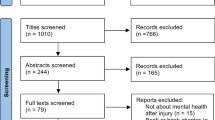Abstract
Purpose
To examine whether the performance-based work-related functional capacity evaluation (German title: Einschätzung körperlicher Leistungsfähigkeiten bei arbeitsbezogenen Aktivitäten—ELA) can predict return to work (RTW) in patients with musculoskeletal disorders (MSD).
Methods
A multicenter cohort study was conducted on 162 employed or self-employed patients with various injury-related and chronic MSD, recruited from four outpatient rehabilitation clinics. Patient-reported data on health and work ability were collected at discharge. The FCE test was performed subsequently. The overall FCE-based estimation of the ability to cope with the physical demands of work (positive vs. negative) was used to predict RTW. Successful RTW was defined as a combination of (self-)employment at the 3-month follow-up and a low level of sick leave (< 1.5 weeks) due to MSD. Odds ratios (OR) and 95% confidence intervals (CIs) were calculated using logistic regression models to evaluate the predictive validity of the adjusted FCE results.
Results
Based on the FCE test, 82% of the patients were estimated as being able to cope with the physical demands of work. 77% of the patients with a positive FCE outcome returned to work (positive predictive value) and 83% with a negative FCE outcome did not (negative predictive value). Patients whose functional capacity was estimated to match the job demands were associated with sixfold higher odds of returning to work after adjusting for patient-reported data on health and work ability. The agreement between the FCE result and RTW differed only on a low to moderate level between the therapists who administered the FCE (72–89%).
Conclusion
The FCE test at discharge predicts RTW among patients with musculoskeletal disorders.

Similar content being viewed by others
Notes
A detailed description can be found in the appendix.
A calculation of the models 1 and 2 based on the 151 participants, that were included in model 3, had only a minor effect on the influence of ELA (OR = 19.4 respectively OR = 18.2). Therefore, it can be assumed that the decline was not caused by the reduction in sample size.
References
Baldwin ML, Butler RJ, Johnson WG, Côte P (2007) Self-reported severity measures as predictors of return-to-work outcomes in occupational back pain. J Occup Rehabil 17(4):683–700
Bethge M, Herbold D, Trowitzsch L, Jacobi C (2011) Work status and health-related quality of life following multimodal work hardening: a cluster randomised trial. J Back Musculoskelet Rehabil 24(3):161–172. https://doi.org/10.3233/BMR-2011-0290
Bethge M, Spanier K, Neugebauer T, Mohnberg I, Radoschewski FM (2015) Self-reported poor work ability—an indicator of need for rehabilitation? A cross-sectional study of a sample of German employees. Am J Phys Med Rehabil 94(11):958–966
Bethge M, Markus M, Streibelt M, Gerlich C, Schuler M (2018) Implementing the German model of work-related medical rehabilitation: did the delivered dose of work-related treatment components increase? Arch Phys Med Rehabil 99(12):2465–2471
Bethge M, Markus M, Streibelt M, Gerlich C, Schuler M (2019) Effects of nationwide implementation of work-related medical rehabilitation in Germany: propensity score matched analysis. Int Arch Occup Environ Health 76(12):913–919. https://doi.org/10.1136/oemed-2019-106065
Bieleman HJ, Stewart R, Reneman MF, van Ittersum WM, van der Schans CP, Drossaers-Bakker KW, Oosterveld FGJ (2018) Trajectories of physical work capacity in early symptomatic osteoarthritis of hip and knee: results from the Cohort Hip and Cohort Knee (CHECK) study. J Occup Rehabil. https://doi.org/10.1007/s10926-018-9809-3
Branton EN, Arnold KM, Appelt SR, Hodges MM, Battié MC, Gross DP (2010) A short-form functional capacity evaluation predicts time to recovery but not sustained return-to-work. J Occup Rehabil 20(3):387–393. https://doi.org/10.1007/s10926-010-9233-9
Bühne D (2018) The prognostic value of functional capacity evaluation in patients with musculoskeletal disorders. Verlag Dr Kovac, Hamburg (German)
Cutler RB, Fishbain DA, Stelle-Rosomoff R, Rosomoff HL (2003) Relationships between functional capacity measures and baseline psychological measures in chronic pain patients. J Occup Rehabil 13(4):249–258
De Baets S, Calders P, Schalley N, Vermeulen K, Vertriest S, Van Peteghem L et al (2018) Updating the evidence on functional capacity evaluation methods: a systematic review. J Occup Rehabil 28(3):418–428. https://doi.org/10.1007/s10926-017-9734-x
Echeita JA, Bethge M, van Holland BJ, Gross DP, Kool J, Oesch P, Trippolini MA et al (2018) Functional capacity evaluation in different societal contexts: results of a multicountry study. J Occup Rehabil. https://doi.org/10.1007/s10926-018-9782-x
Edelaar MJA, Gross PD, James CL, Reneman MF (2018) Functional capacity evaluation research: report from the third international functional capacity evaluation research meeting. J Occup Rehabil 28(1):130–134. https://doi.org/10.1007/s10926-017-9707-0
Fishbain DA, Cutler RB, Rosomoff H, Khalil T, Abdel-Moty E, Steele-Rosomoff R (1999) Validity of the dictionary of occupational titles residual functional capacity battery. Clin J Pain 15(2):102–110
Fore L, Perez Y, Neblett R, Asih S, Mayer TG, Gatchel RJ (2015) Improved functional capacity evaluation performance predicts successful return to work 1 year after completing a functional restoration rehabilitation program. PMR 7(4):365–375. https://doi.org/10.1016/j.pmrj.2014.09.013
Gouttebarge V, Kuijer PP, Wind H, van Duivenbooden C, Sluiter JK, Frings-Dresen MH (2009) Criterion-related validity of functional capacity evaluation lifting tests on future work disability risk and return to work in the construction industry. Occup Environ Med 66(10):657–663. https://doi.org/10.1136/oem.2008.042903
Gross DP, Battié MC (2004) The prognostic value of functional capacity evaluation in patients with chronic low back pain: part 2: sustained recovery. Spine 29(8):920–924
Gross DP, Battié MC (2005) Functional capacity evaluation performance does not predict sustained return to work in claimants with chronic back pain. J Occup Rehabil 15(3):285–294
Gross DP, Battié MC (2006) Does functional capacity evaluation predict recovery in workers’ compensation claimants with upper extremity disorders? Occup Environ Med 63:404–410
Gross DP, Battié MC, Cassidy JD (2004) The prognostic value of functional capacity evaluation in patients with chronic low back pain: part 1: timely return to work. Spine 29(8):914–919
Gross DP, Battié MC, Asante A (2006) Development and validation of a short-form functional capacity evaluation for use in claimants with low back disorders. J Occup Rehabil 16(1):53–62. https://doi.org/10.1007/s10926-005-9008-x
Hosmer DW, Lemeshow S, Sturdivant RX (2013) Applied logistic regression, 3rd edn. Wiley, New York
Ilmarinen J, Tuomi K, Klockars M (1997) Changes in the work ability of active employees as measured by the work ability index over an 11-year period. Scand J Work Environ Health 23(1):49–57
Isernhagen SJ (1992) Functional capacity evaluation: rationale, procedure, utility of the kinesiophysical approach. J Occup Rehabil 2(3):157–168. https://doi.org/10.1007/BF01077187
King PM, Tuckwell N, Barrett TE (1998) A critical review of functional capacity evaluations. Phys Ther 78:852–866
Kuijer PPFM, Gouttebarge V, Brouwer S, Reneman MF, Fings-Dresen MHW (2012a) Are performance-based measures predictive of work participation in patients with musculoskeletal disorders? A systematic review. Int Arch Occup Environ Health 85:109–123
Kuijer PPFM, Gouttebarge V, Wind H, van Duivenbooden C, Sluiter JK, Frings-Dresen MHW (2012b) Prognostic value of self-reported work ability and performance-based lifting tests for sustainable return to work among construction workers. Scand J Work Environ Health 38(6):600–603. https://doi.org/10.5271/sjweh.3302
Lakke SE, Soer R, Krijnen WP, van der Schans CP, Reneman MF, Geertzen JHB (2015) Influence of physical therapists’ kinesiophobic beliefs on lifting capacity in healthy adults. Phys Ther 95(9):1224–1233. https://doi.org/10.2522/ptj.20130194
Lechner DE, Page JJ, Sheffield G (2008) Predictive validity of a functional capacity evaluation: the physical work performance evaluation. Work 31(1):21–25
Löffler S, Wolf HD, Gerlich C, Vogel H (2008) Würzburger Screening. Universität Würzburg, Würzburg
Matheson LN (2003) The functional capacity evaluation. In: Demeter SL, Andersson GBJ (eds) Disability evaluation. Mosby Yearbook, Chicago, pp 748–768
Matheson LN, Isernhagen SJ, Hart DL (2002) Relationships among lifting ability, grip force, and return to work. Phys Ther 82:249–256
Muche R (2008) Logistic regression—a useful tool in rehabilitation research. Rehabilitation 47(1):56–62. https://doi.org/10.1055/s-2007-992790(German)
Schindl M, Wassipaul S, Wagner T, Gstaltner K, Bethge M (2019) Impact of functional capacity evaluation on patient-reported functional ability: an exploratory diagnostic before–after study. J Occup Rehabil. 29(4):711–717. https://doi.org/10.1007/s10926-019-09829-2
Streibelt M, Blume C, Thren K (2009) Value of functional capacity evaluation information in a clinical setting for predicting return to work. Arch Phys Med Rehabil 90(3):429–434. https://doi.org/10.1016/j.apmr.2008.08.218
Tüscher J, Burrus C, Vuistiner P, Léger B, Rivier G, Luthi F (2018) Predictive value of the fear avoidance model on functional capacity evaluation. J Occup Rehabil 28(3):513–522. https://doi.org/10.1007/s10926-017-9737-7
Vowles KE, Gross RT, Sorrell JT (2004) Predicting work status following interdisciplinary treatment for chronic pain. Eur J Pain 4:351–358
Ware JE, Sherbourne CD (1992) The MOS 36-item short-form health survey (SF-36): I. conceptual framework and item selection. Med Care 30(6):473–483
Wind H, Gouttebarge V, Kuijer PPFM, Sluiter JK, Frings-Dresen MHW (2009) Effect of functional capacity evaluation information on the judgment of physicians about physical work ability in the context of disability claims. Int Arch Occup Environ Health 82(9):1087–1096
Acknowledgements
We would like to thank the following institutions for assistance with data collection and study implementation: ASR Rehabilitationszentren (location: Cologne), Regio-RehaTagesklinik Freiburg, medicoreha Welsink Rehabilitation (location: Neuss) and Reha Viersen.
Funding
There was no funding for the study.
Author information
Authors and Affiliations
Corresponding author
Ethics declarations
Conflict of interest
Some authors are employees of the Institute for Quality Assurance in Prevention and Rehabilitation at the German Sport University Cologne, which is responsible for the development and training of ELA. The other authors declare that they have no conflict of interest.
Ethical approval
All subjects gave their informed written consent and the study was approved by the Ethics Committee of the German Sport University Cologne.
Additional information
Publisher's Note
Springer Nature remains neutral with regard to jurisdictional claims in published maps and institutional affiliations.
Electronic supplementary material
Below is the link to the electronic supplementary material.
Rights and permissions
About this article
Cite this article
Bühne, D., Alles, T., Hetzel, C. et al. Predictive validity of a customized functional capacity evaluation in patients with musculoskeletal disorders. Int Arch Occup Environ Health 93, 635–643 (2020). https://doi.org/10.1007/s00420-020-01518-5
Received:
Accepted:
Published:
Issue Date:
DOI: https://doi.org/10.1007/s00420-020-01518-5




